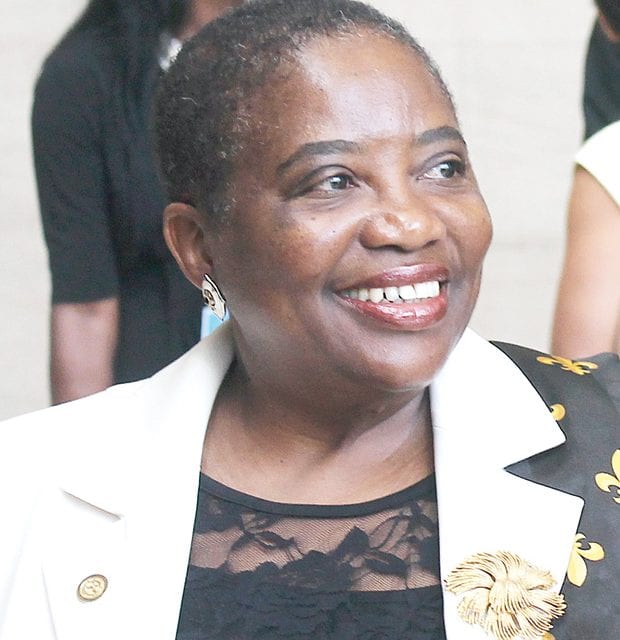Councilwoman who refuses to sign a city council welcome letter for Pride came up with wording for a resolution that supports LGBT bills

LEADING THE CHARGE | Councilwoman Vonciel Jones Hill chaired a committee advancing all of Dallas’ legislative priorities.
Vonciel Jones Hill this week proposed a resolution that will advance LGBT equality legislation on the agenda of the Dallas lobbyists in Austin during the upcoming session. The proposal allows the LGBT Task Force to recommend additions to that agenda without a cumbersome process that bogged down efforts in the last legislative session.
Hill — best known in the LGBT community for being the only Dallas City Council member to refuse to sign a letter welcoming people to the city for Pride and refusing to ride on the council’s parade float — worded a resolution that LGBT Task Force members called a brilliant approach.
Every two years, the Dallas City Council appoints an ad hoc committee to instruct its lobbyists in Austin what agenda items to advance. This year’s committee is made up of the seven council members who chair the council’s other committees. Hill chairs the ad hoc committee.
The committee has taken input on agenda items from council members and a number of sources including the LGBT Task Force.
Former Councilwoman Delia Jasso started the LGBT Task Force as an unofficial advisory group when she learned that no discrimination cases had been prosecuted since the Dallas non-discrimination ordinance was passed a decade earlier. After Jasso left office in 2013, Mayor Michael Rawlings made the LGBT Task Force an official city task force and appointed Councilman Adam Medrano as its chair.
The task force has been discussing issues it wants the city’s lobbyist to address in Austin when the legislature convenes in January. Employment non-discrimination heads the list.
While an employment non-discrimination bill may be introduced, most of the work for LGBT advocates in Austin revolves around killing bad legislation.
While some items — like restricting gays and lesbians from adopting — pop up regularly, it’s hard to guess what malicious bills may be introduced. Last session a contentious debate over LGBT resource centers at state universities appeared on the agenda with little warning.
Medrano said he presented Hill with a list of items upon which the task force had agreed. But Hill had a better solution and came up with wording for a resolution that avoids debate on individual items.
“Support legislative recommendations from city task forces (such as the LGBT Task Force, the Education Task Force, the Poverty Task Force, the Domestic Violence Task Force, the Fair Park Task Force and others) that are consistent with the policies of the city council, the city’s legislative agenda and city council strategic priorities,” Hill’s resolution reads.
Dallas Gay and Lesbian Alliance President Patti Fink, a member of the LGBT Task Force, said, “The strategy is to not argue over every little item.”
In addition, she said, Hill’s resolution allows the lobbyists to address any negative legislation not anticipated.
Dallas lobbyist Larry Castro said he spends most of his time addressing anti-municipal legislation every session. Many of these bills, introduced by rural legislators, restrict the power of cities.
At a hearing at Dallas City Hall on Monday, Sept. 22, Castro said he expected a bill that would restrict a city’s right to protect categories of people not covered by federal law. The bill would be presented to counter Houston’s HERO ordinance and San Antonio’s recent non-discrimination law that have been controversial and prompted failed recall bids in both cities. That law would also invalidate the Fort Worth and Dallas ordinances that have been in effect for more than a decade without controversy.
In the last session of the legislature, LGBT activists wanted Dallas lobbyists to work with Equality Texas to help derail some bad legislation.
In June 2013, the LGBT community clashed with city council members over a resolution proposed by Councilman Scott Griggs.
Former Mayor Pro Tem Pauline Medrano put the resolution supporting marriage equality and statewide LGBT-inclusive workplace protections on the agenda while Rawlings was out of the country. To get the resolution off the agenda, the mayor called in from Brazil and was considered present.
LGBT activists attended the city council meeting wearing red and stood, turning their backs to council members who opposed the resolution.
The process of getting Griggs’ resolution of support was so slow and divisive, however, that by the time the council addressed it, the legislative session was over.
Hill’s resolution for the upcoming session avoids that sort of divisive debate.
At the Sept. 21 briefing, Castro presented a list of major items he plans to address with legislators. The issues involve everything from urban blight and code enforcement to designating Dallas as the official home of the 2036 Texas Bicentennial celebration. City council members from the southern sector of the city pushed him to support legislation allowing for stricter regulation and inspection of boarding houses, which are a problem in their districts.
Castro said he has a general rule for supporting or opposing legislation.
“If it expands city authority, I support it,” he said.
The LGBT resolution along with the full lobbying agenda will be discussed by the full city council at its briefing on Oct. 15 and voted by the council on Oct. 22.
This article appeared in the Dallas Voice print edition September 26, 2014.

